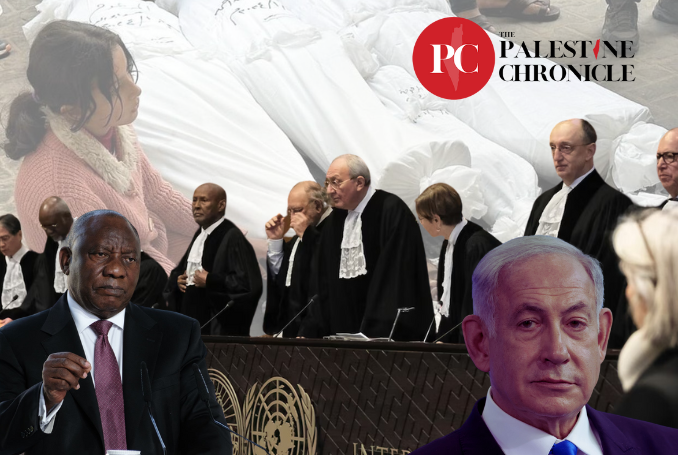
From its inception, Israel has sought to remove the native population and build a settler state on Palestinian land. Its leaders have used international organizations and the Western powers that created them to carry out their settler-colonial objectives.
Dr. Martin Luther King, Jr. delivered his “How Long? Not Long” speech on March 25, 1965, following the historic voting-rights marches from Selma to Montgomery, Alabama.
He told the thousands who had gathered on the steps of the Alabama State Capitol that the days of Southern white brutality were waning. Although delivered 59 years ago, Dr. King’s words speak to the souls of Palestinians and their worldwide supporters who today envisage the waning days of Israeli brutality:
“I know you are asking today, ‘How long will it take?’.…
it will not be long, because truth crushed to the earth will rise again.
How long? Not long, because no lie can live forever.
How long? Not long, because you shall reap what you sow.
How long? Not long, because the arc of the moral universe is long,
but it bends toward justice.”
Dr. King’s words have taken on extra meaning as Israel began its genocidal campaign in the Gaza Strip following the Palestinian attack of October 7. For over 75 years, Israel has been lying about its birth and aims in Palestine. The insurrection put an end to the lie. The global community could see firsthand what Israel’s settler-colonial project really looks like; a project it has been carrying out incrementally from 1947 to the present.
History is important in assessing the present. With that in mind, I set out to examine how international organizations have failed the Palestinians and how they have legitimized Israel’s settler-colonial project in Palestine. The ruling of the International Court of Justice (ICJ) in the genocide case against Israel has proved to be a useful starting point in examining that historic failure.
Failures of the international community and institutions began, however, long before the ruling of January 26.
The Republic of South Africa on January 11 presented its case before the ICJ accusing Israel of violating the 1948 UN Genocide Convention with its war on Gaza. The Court ruled that South Africa’s case had merit; and on first impression, Israel has been committing genocide in Gaza. Based on the evidence, the Court decided to go ahead with full proceedings to render a final verdict.
In a series of provisional emergency rulings, Israel was ordered to “take all measures” to avoid acts of genocide and to allow the entry of more humanitarian aid. The interim decision, however, did not explicitly enjoin Israel to cease its military attacks or to lift its siege on Gaza. Without it, Israel has continued its attacks.
In its well-documented 84-page petition to the Court, South Africa has, however, publicly exposed Israel’s horrific crimes against the Palestinians.
All Genocide Convention signatory states have a binding obligation to refrain from complicity in genocide and to take concrete steps to prevent it. If the United States, Israel’s principal patron, continues to provide financial and military aid, they do so knowing they are abetting genocide.
Israel used the circuitous language of the Court to continue its barbarous acts. According to Euro-Med Human Rights Monitor, the Israeli army killed 373 Palestinians, 345 of them civilians, and injured 643 more two days after the ICJ ruling.
For the Palestinians, the ICJ is just another example of a world body that has failed them. They have little reason to trust international organizations, since it was the Western powers and institutions that have tried to delete their nationality and nation from the pages of history.
Institutions created to establish peace, security and harmony, such as the League of Nations after the First World War and the United Nations after the Second World War have done little to advance the cause of Palestine and its people.
The victorious Allied Powers gave birth to the League of Nations in 1920. It granted Britain a Mandate for Palestine (colonial authority) in 1922. Although the mandate required entrusted land be developed for the benefit of the native population, in reality the British had already promised Palestine to Zionists in Europe in 1917. That consequential promise was delivered in an ambiguously-worded letter written by Britain’s foreign secretary, James A. Balfour, known as the Balfour Declaration.
Before its publication, the Balfour letter had been submitted and approved by U.S. President Woodrow Wilson; and in early 1918, it was publicly endorsed by the French and Italian governments. As we can see today, it has become one of the greatest mistakes of Allied imperial history.
Palestinians would fare no better in 1945 under the League’s successor, the United Nations. One of its earliest undertakings was to set in motion the legitimization of a European foreign entity in Palestine.
The UN General Assembly, in September 1947, set up a Special Committee on Palestine (UNSCOP) to find solutions to the Palestine “problem;” after Britain announced its decision to abrogate its mandate. The Committee proposed that Palestine be divided into two independent economically linked states, one Arab and one Jewish, with al-Quds (Jerusalem) administered by the United Nations.
It should be noted that no Arab representative was included on the Committee; an exclusion that clearly favored the Jewish minority.
Although Palestinians comprised two-thirds of the population and owned most of the land (in 1947-48, Jews owned only 6 percent of the land); astonishingly UNSCOP recommended that 56 percent of the total land be allocated to the Jewish state and only 42 percent to the Palestinian state.
The Jewish state would also have sole access to the crucial water supply of the Sea of Galilee and the economically important Red Sea (about two-thirds of the Palestinian coast), while the Palestinian state would be deprived of seaports and key agricultural lands.
Finally, on November 29, 1947, after intense lobbying by Washington and Zionist lobbies, the General Assembly adopted Resolution 181, recommending the partition of Palestine—further legitimizing Zionist settler-colonialism.
It should be emphasized that the UN General Assembly had no authority to partition Palestine.According to the 1945 UN Charter, only the Security Council has the power to pass legally-binding resolutions. Resolution 181 was never considered nor approved by the Council. Hence, the creation of the state of Israel has been illegal.
Shortly after Israel christened itself a state on May 14, 1948, the armies of Lebanon, Syria, Iraq and Egypt declared war on it.
By the end of the war in 1949, Israel had expanded to include 78 percent of historical Palestine, including the larger part of al-Quds. The remaining 22 percent fell under the administration of Egypt (the Gaza Strip) and Jordan (the West Bank).
The United Nations admitted Israel as a member on May 11, 1949; thereby, legitimizing its takeover of 78 percent of Palestine through warfare.
In December 1948, the UNGA adopted Resolution 194, establishing the right of return for all Palestinians, property restitution and compensation, which Israel promptly ignored. To the present, Tel Aviv has denied Palestinians the right to return to their homes. According to Amnesty International, since 1948, more than 5 million Palestinian refugees are scattered throughout the Middle East.
Even Israeli assassinations of UN personnel have gone unpunished. Israel, for example, has never faced prosecution for its assassination on September 17, 1948 of Swedish diplomat and UN Mediator for Palestine, Count Folke Bernadotte . Bernadotte was murdered in Jerusalem by Zionist Lehi (Stern Gang) terrorists. Yitzhak Shamir, Israel’s eighth prime minister, was one of the Stern Gang leaders who planned and approved his murder.
Most recently, Israel has faced no consequences for the 152 UNRWA staff who have been killed in Gaza (as of January 15) by Israeli bombs. According to UN Secretary General Antonio Guterres, it is the largest single loss of life in the history of the organization.
The United Nations continued its assault on Palestinian national identity when it adopted Security Council Resolution 242 on 22 November 1967.
At the end of the Arab-Israel War (June 5 to June 10, 1967), Israel controlled what remained of Palestine: East Jerusalem, the West Bank and Gaza Strip. They also captured the Golan Heights from Syria and the Sinai Peninsula from Egypt.
The United Nation’s solution to effect a “just and lasting peace in the Middle East” was to adopt British-drafted Resolution 242. To effect the peace, it called for the application of the following principles: 1) withdrawal of Israel armed forces from territories occupied in the recent conflict; 2) acknowledgment of the sovereignty, territorial integrity and political independence of every state in the area; 3) settlement of the refugee problem.
If they had agreed to the resolution, the Arab parties would have given official recognition to the Jewish state and its seizure of most of Palestine in 1948.
Palestinians had no seat at the table when the United Nations debated and adopted the resolution. Although it called for recognition of Israel by its neighbors— what the United States and Israel wanted—there was no push for the creation of a Palestinian state or recognition of their right to national self-determination. When mentioned, Palestinians were identified simply as a “refugee problem.”
Since Israel’s occupation of more Palestinian land in 1967, the international community has failed to uphold implementation of SC resolutions 242 and 338 (reaffirming 242), calling for Israel’s withdrawal from the occupied territories. Nothing has been done on behalf of the Palestinians. The resolution has simply become a fig-leaf roadmap for Washington’s so-called attempts at peacemaking.
The United Nations was instrumental in producing Israel and in sustaining it. Chapter V, Article 25 of the UN Charter states that “Members of the United Nations agree to accept and carry out the decisions of the Security Council in accordance with the present Charter.” Israel has been given free rein, owing primarily to American patronage and diplomatic cover, to operate outside international conventions.
From its inception, Israel has sought to remove the native population and build a settler state on Palestinian land. Its leaders have used international organizations and the Western powers that created them to carry out their settler-colonial objectives. Having accomplished their aims, Israeli leaders has seen no reason to obey the rules of international bodies that have so willingly assisted and truckled under pressure from them.
Israel is slowly losing the political battle for Palestine in the global community as it publicly carries out its genocidal designs. The future of global justice has become intrinsically linked to Palestine. The question is whether Israel—the last of the settler colonies—will be allowed to continue pursuing its apartheid policies and conduct itself as a rogue state.
International organizations and institutions have the powerful tool of isolation and a number of consequences they could impose on Israel to end its cruel and destabilizing imperialist project. If not now, when?

– Dr. M. Reza Behnam is a political scientist specializing in the history, politics and governments of the Middle East. He contributed this article to The Palestine Chronicle.








Israel cannot claim to be a response to the Nazi Persecution of the European Jews. The US and the UK adopted the Atlantic Charter, an expression of principles, in 1941, which declares the following: “Second, they desire to see no territorial changes that do not accord with the freely expressed wishes of the peoples concerned;” and under no circumstances can the Nakba, ie ethnic cleansing be regarded as freely expressed wishes of the Palestinians. The Atlantic Charter fwiw, was drawn on by the drafters of the UN Charter.